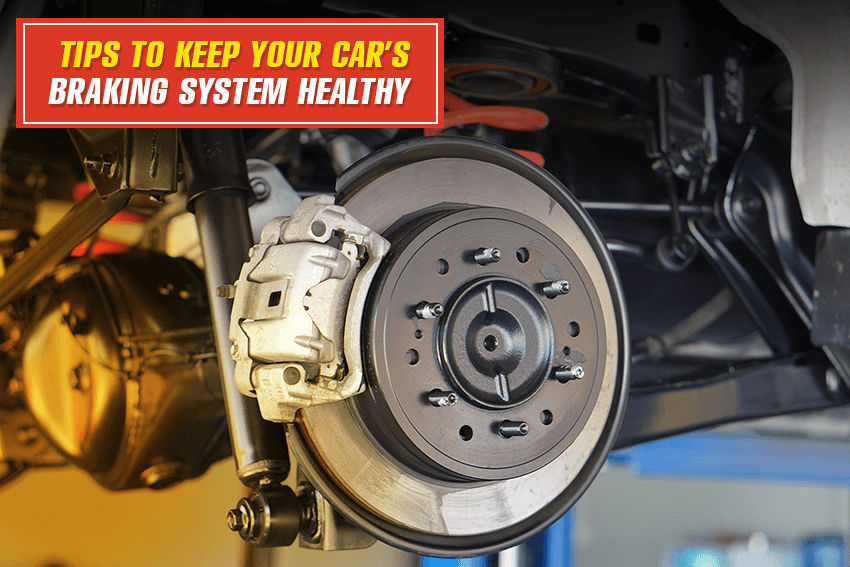Tips to keep your car’s Braking System Healthy

The brake of an automobile is the most critical component and you should provide special attention to get them up to the mark all the time. You might afford some malfunctioning in the car’s infotainment or air conditioning system, but even a slight abnormality in the braking could lead to fatal consequences. Here are 6 pro tips that will help you maintain good health of your car and keep them functioning smoothly.
1) Drive Sedately: The simplest method you can adopt to extend the life of your car’s braking system is to drive in a slow and sedate manner. Not only this driving style reduces the wearing of brake pads but it also ensures that you get maximum mileage from your car. For example, if you drive in the range of 60-80 kilometer per hour while keeping the engine hovering around 2000 rpm, you will be able to achieve maximum fuel efficiency from the engine. Also, you won’t require using the brake much and that will extend the life of brake pads.
2) Get the foot off the accelerator: One of the smartest ways to save brakes from excessive wear is to anticipate the traffic condition and accordingly, changing your inputs to the accelerator. If you see heavy traffic far rather the first thing you need to do is to get your foot off the accelerator. Let the car roll on with decreasing pace and then apply the brake as it nears traffic. Such kind of a driving style will put less strain on the braking system and you will be surprised by its benefits. In fact, many times you need not apply brakes the moment you reach the point of congestion, the traffic starts moving and you can again dab the accelerator to keep going.
3) Use your right foot for braking: Blame it either on our laziness or weird sense of experimentation; many of us develop a habit of dabbing the brake with a left foot. You must avoid this at any cost and make sure you use your right foot for applying the brake irrespective of whether light or heavy braking is required.
4) Replace Brakes regularly: The choice between low-cost and high-cost brakes is something you should be very careful about. As mentioned above, we can’t afford even a slightest of irregularity in the brakes, and therefore you should not compromise on the quality of brakes. Low-cost options tend to wear fast and their stopping power declines considerably after a certain period of time. High-quality discs and pads also wear with the passage of time but the rate of erosion is far slower than the low-cost. Besides, high-quality brakes provide consistently good stopping power and should be the natural choice for owners to go with.
5) Periodic replacement of brake fluid: If you get your car serviced regularly, then this factor is taken care of automatically. Still, it is a good practice to check all fluids in the car regularly with special attention devoted to checking the level of brake fluid. Brake fluid has a tendency to attract moisture which could result in corrosion and damage of rubber seals. Also, if the driver uses the brake repeatedly the fluid will boil resulting in degradation in the car’s stopping power.
6) Avoid overloading: If you overload your car (either with passengers or cargo), it will have an adverse impact on the braking system. A car that is loaded heavily requires more stopping power than the vehicle carrying nominal loads. Along with brakes, loading the car with extra weight will have an adverse impact on the performance of the engine, fuel-efficiency numbers, and longevity of the tires. It is, therefore, recommended that you should keep your car light by avoiding loading it with unnecessary things.
If you are not sure about the effectiveness of the braking system then you should immediately get it checked at the authorized service center of your car’s brand. There is no scope of dillydallying as it might have serious implications for your safety.
Also Read:- Synthetic Oil Vs. Conventional Oil: Which One You Should Go For?